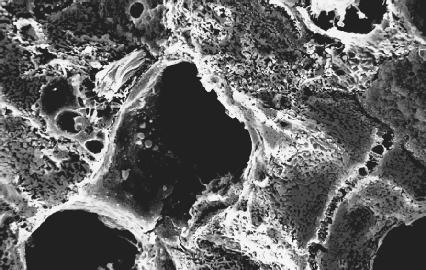Alcoholism - Symptoms
The symptoms of alcoholism can be broken down into two major categories: symptoms of acute (immediate) alcohol use and symptoms of chronic (long-term) alcohol use.
Acute Effects of Alcohol Use
Any amount of alcohol that a person consumes goes quickly to the brain. There it exerts a numbing effect. An individual may experience mild mood swings, or have trouble walking or maintaining balance. He or she may not be able to speak clearly and may lose coordination. The loss of coordination accounts for the high rate of accidents involving alcoholism.
As the level of alcohol in a person's blood increases, physical problems become more serious. Heart and respiration (breathing) rates slow down. At high enough alcohol levels, a person may fall into a coma and even die.
- Dependence:
- A state in which a person requires a steady amount of a particular drug in order to avoid experiencing the symptoms of withdrawal.
- Detoxification:
- The phase of treatment during which a patient stops drinking, and harmful chemicals are removed from his or her system.
- Tolerance:
- The condition under which a drug user becomes physically accustomed to a particular quantity of a drug, such as alcohol.
- Withdrawal:
- Those signs and symptoms experienced by a person who has become physically dependent on a drug, exhibited when the drug's dosage is decreased or discontinued.
Chronic Effects of Alcohol Use
Long-term use of alcohol can affect virtually every organ system of the body:
- Blood. Alcohol can cause changes in all kinds of blood cells. It can reduce the production of white blood cells, for example, which weakens a person's immune system. This means that an individual loses the ability to fight off disease and infection. Blood platelets (pronounced PLATE-lit; blood cells that help blood clot) can also be damaged, increasing the risk of bleeding.
- Gastrointestinal system. Alcohol exerts its effects on nearly every part of the digestive system. It can damage muscles in the stomach lining, allowing stomach acid to flow upwards and back into the esophagus (pronounced ee-SAH-fuh-guss). This action causes pain and bleeding in the esophagus, which is the tubal passage through which food moves from the throat to the stomach.
- Heart. High levels of alcohol in the blood can cause a number of problems in the heart and circulatory system. Heart size tends to increase, heart muscles become weaker, and abnormal heart rhythms begin to appear. All of these changes increase the risk of stroke (the blocking of a brain blood vessel by means of a blood clot; see stroke entry).
- Liver. Alcohol interferes with a number of important chemical reactions that take place in the liver. In order to combat this problem, the liver begins to enlarge and fill in with fat and scar tissue. These materials interfere with the liver's normal function and result in the diseases cirrhosis (pronounced suh-RO-suss) and hepatitis (pronounced hep-uh-TIE-tuss; see hepatitis entry). Both conditions can be fatal.
- Nervous system. Heavy drinking can cause blackouts and loss of memory. By some estimates 30 to 40 percent of all men in their teens and twenties have experienced an alcoholic blackout. Over time, alcohol abuse can also cause sleep disturbances and numbness and tingling in the arms and legs. Two major diseases of the nervous system are associated with alcohol abuse: Wernicke's syndrome and Korsakoff's syndrome. Both are caused by low thiamine (pronouonced THIE-uh-min), or B-vitamin, levels produced by excessive consumption of alcohol.
- Reproductive system. Heavy drinking has a tendency to reduce the size of both testicles and ovaries, the reproductive organs in men and women, respectively. As a result, there is a reduction in the number of sperm and eggs produced, which makes becoming pregnant more difficult.

Alcohol can also cause a condition called pancreatitis (pronounced PANG-kree-uh-TIE-tis), which is an inflammation of the pancreas. Damage to the pancreas, in turn, can result in bouts of diarrhea, diabetes (see diabetes entry), and other serious and painful conditions. If left untreated, a person may eventually lose their ability to produce the enzymes the body needs to digest food and may even die.
Babies born to women who consumed alcohol during their pregnancy may develop a condition known as fetal alcohol syndrome. This disorder may cause facial defects, reduced intelligence, and long-term behavioral problems in the child.

Comment about this article, ask questions, or add new information about this topic: